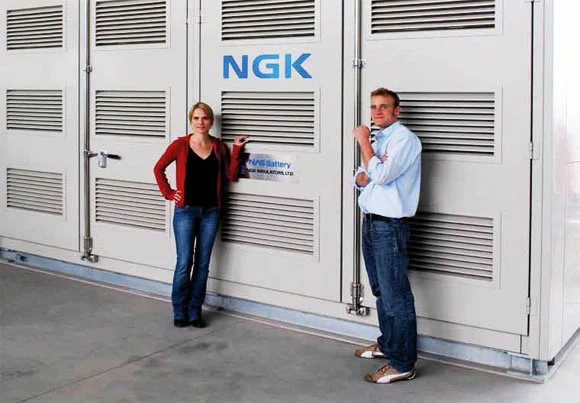Nucleus for innovative storage solutions
Approaches for a self-sufficient energy supply
From 2014, the 5,000 inhabitants of the Azorean island of Graciosa can expect far greater independence from the mainland. The Adlershof company Younicos will be converting the island’s electricity grid to provide the greater part of its power from renewable sources. The Younicos production halls are already operating a model that simulates the processes on a scale of 1:3.
The new system on the island will consist of photovoltaic modules and wind energy converters as the power supplies and a hybrid energy storage system delivering 2.7 MW. Its combination of sodium-sulphur and lithium ion batteries provides fast compensation for any fluctuations in the grid.
“The project demonstrates that a stable supply with renewable energy is possible with the storage technologies available today,” explained Managing Director Clemens Triebel. “According to the model study, the diesel generators that are currently providing the island’s electricity will now be running only for about 1600 hours a year.” This means that the sun and wind can provide a good 70% of the island’s energy needs. Set up in 2008 by former Solon cofounder Clemens Triebel and other Clean-Tech pioneers, Younicos intends to install the system on other islands. In addition, a 5 MW battery park will soon be set up in the north of Germany.
Self-sufficient energy supply – this is also the business line pursued by Erich Hans Bosch. A former Younicos employee, the engineer gained momentum with his own company Renewable Storage two years ago. Bosch’s system of self-sufficient energy supply “can deliver up to 400 kW of electricity,” he claims, and is therefore capable of fulfilling the power demand of entire villages. This would be an interesting solution for holiday resorts in nature reserves and for production sites far from the electricity grid, for instance in developing countries.
These are the operating grounds of the company Heliocentris Energy Solutions AG. In 2012, the Mozambican mobile telephone operator mcel ordered 500 energy management systems from this Adlershof company. They allow the remote control of base stations, thereby reducing energy consumption and maintenance costs. “The solutions available today can help to reduce diesel consumption by up to 50 percent and operating costs by up to 70 percent,” explained CFO András Gosztonyi.
In 2012 Heliocentris achieved a turnover of Euro 7.5 million, more than double the previous year’s figure. The board is expecting yet another significant boost to turnover in 2013 as well. With 130 personnel, subsidiaries in Vancouver and Dubai, offices in Johannesburg and Singapore, and customers in over sixty countries, Heliocentris has adopted a powerful
international position.
By Mirko Heinemann for Adlershof Special
